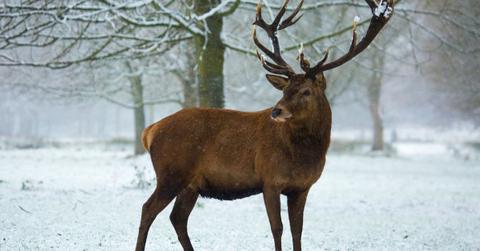Scientists Warn 'Zombie Deer Disease' That Causes Stumbling, Vacant Stares Spreading Across U.S.

Scientists are sounding the alarm about "Zombie Deer Disease" that could spread to humans.
Chronic Wasting Disease, also known as "Zombie Deer Disease," is a rapidly spreading ailment with potential implications for human health.
Recent findings reveal that this neurological disorder, characterized by symptoms like lethargy, stumbling and vacant stares, has been identified in over 800 samples of deer, elk and moose in Wyoming alone.
According to the Centers for Disease Control and Prevention (CDC), as of November 2023, CWD has been reported in at least 31 states across free-ranging deer, elk and moose populations, along with occurrences in three Canadian provinces.
Scientists, including Nottingham Trent University Professors Samuel J. White and Philippe B. Wilson, attribute the cause of this degenerative nerve disease to prions.
Prions are abnormal proteins that induce misfolding in normal brain proteins, leading to neurological degeneration. Alarmingly, prions are highly resilient, persisting for years and resisting conventional disinfection methods like formaldehyde, radiation and extreme temperature incineration.
While conclusive evidence linking CWD to human health issues is lacking, concerns persist due to laboratory experiments showing prion propagation with human cells. Although transmission hasn't yet been observed in humans, the risk arises from exposure to potentially infected animals during hunting and consumption.
A 2019 study revealed that between seven and 15,000 CWD-infected animals were consumed in 2017 alone. Moreover, even non-consumers face exposure risks through contaminated water, soil and environmental sources.
The impact of CWD extends beyond human health concerns. It threatens the livelihoods of communities reliant on deer hunting and poses risks to food security if deer populations decline significantly.
- New Mexico Man Dies from Bubonic Plague; Health Officials Warn of 'Threat Posed by This Ancient Disease'
- Triple Threat: Rise of Polio, Rift Valley Fever and Red Eye Disease Spark Fear in This Country
- What Lies Beneath: NASA Scientist Believes Aliens May Have Found 'Perfect' Hiding Spot in Earth's Oceans
Additionally, the disease could adversely affect plant and soil health as deer play a crucial role in vegetation management. Furthermore, other wildlife dependent on deer for food or habitat modification may also suffer.
Internationally, CWD presents a widespread challenge, with cases recorded in reindeer and moose populations in Scandinavia, as well as isolated incidents reported in South Korea.
Never miss a story — sign up for the Front Page Detectives newsletter. Be on the scene the moment news breaks.
Farm-raised deer and elk are also susceptible. Given its global scope, international cooperation is essential to monitor and control the spread of CWD.
To address this pressing issue, White and Wilson recommend several key steps, including enhancing surveillance and monitoring efforts, controlling the movement of deer and elk populations to prevent transmission, conducting regular testing to assess disease prevalence and promoting responsible hunting practices to mitigate transmission risks.
They emphasize the need for further research to deepen our understanding of CWD's transmission dynamics, ecological impacts and potential human health consequences.
Become a Front Page Detective
Sign up to receive breaking
Front Page Detectives
news and exclusive investigations.
